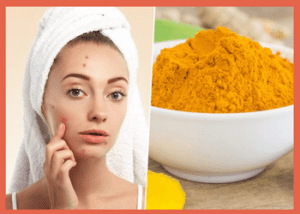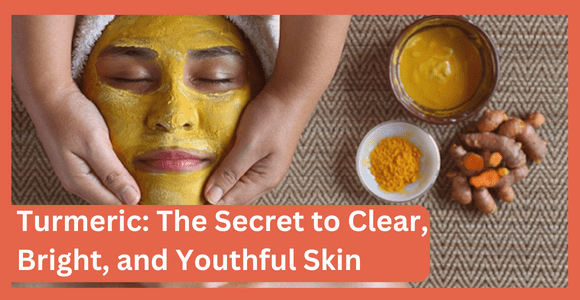For millennia, turmeric has been a beloved go-to remedy for any and all ailments. It’s settled queasy stomachs, healed colds, disinfected wounds, battled acne, and even resurrected sun-damaged complexions – turning brides into glowing goddesses in the process! As such, it rightfully earned its reputation as one of the most hardworking spices known to humankind.
For centuries, Ayurveda has used the spice turmeric to take advantage of its remarkable benefits for the skin. Even in modern skincare, it remains a popular and beloved ingredient due to those very same advantages.
The turmeric root is the origin of this wellness powerhouse, and it carries a compound known as curcumin. Curcumin has strong antioxidant, antibacterial, and anti-inflammatory components — plus there are countless benefits to be gained from using it.
There’s never been an easier or more effective way to get all the amazing advantages that come with including turmeric in your daily routine.
Table of Contents
Turmeric Benefits for Skin: Everything You Need to Know
Searching for a holistic method to restore your skin’s health? Look no further than turmeric! Not only has this herb been used medicinally throughout history, but it is also incredibly beneficial for the skin. Give yourself some TLC with this natural option and you’ll be sure to reap its rewards.
| Benefit | Description |
|---|---|
| Promotes healthy skin | It has anti-inflammatory, antimicrobial, and antioxidant effects that can benefit the skin. It has been reported to help with eczema, psoriasis, acne, and wound healing. |
| Manages oily skin | It helps regulate the production of sebum, an oily substance produced by the sebaceous glands. |
| Combats acne | It has antiseptic and antibacterial properties that fight pimples and breakouts. It also reduces inflammation and evens out skin discolorations. |
| Brightens skin | It contains the antioxidant curcumin, which is also anti-inflammatory and can lighten pigmentation. This can help reduce dark spots on the skin, can help with whitening skin. |
| Reduces facial hair | Kasturi turmeric is used in many cultures as a facial hair reducer. However, studies haven’t proven its effectiveness. Mixing Kasturi turmeric with chickpea flour or adding it to a facial scrub may help. |
| Improves fine lines and wrinkles | Anti-aging benefits that can help to slow down the skin’s aging process. It can help to diminish wrinkles, keep skin supple, and improve skin elasticity. |
How Can Turmeric be Used in DIY Skin Care?
Turmeric is a popular component in DIY skin-care recipes, so why not take advantage of all the ingredients you already have in your pantry?
 Although Robinson, an experienced cosmetic chemist prefers to use products from reputable manufacturers for maximum safety, Dr. Collier suggests that several items around your house may mix perfectly with turmeric for a safe and creative home care treatment.
Although Robinson, an experienced cosmetic chemist prefers to use products from reputable manufacturers for maximum safety, Dr. Collier suggests that several items around your house may mix perfectly with turmeric for a safe and creative home care treatment.
According to Dr. Collier, combining honey with turmeric is a perfect match due to the natural humectant qualities of honey.
Additionally, adding milk or yogurt because of lactic acid’s function as a natural exfoliant also makes for an excellent combination.
She suggests her favorite mask made up of one tablespoon honey, one teaspoon turmeric, and several drops of rosewater – simply mix it all into paste form and leave it on your face for five to 10 minutes before thoroughly rinsing off with warm water.
Risks of Using Turmeric for Your Skin
Although beneficial, there are certain risks you should be aware of when using turmeric. To ensure optimal results from this herbal remedy, it’s essential to pay attention to the dosage and type of product used as well as its potential interactions with other medications consumed.
Unfortunately, due to its low bioavailability rate, your metabolism rapidly burns off turmeric before much can be absorbed by your body; thus reducing effectiveness.
 When incorporating turmeric into your routine, it is essential to exercise caution. Start with a small dosage and wait for the reaction from your body before you take more. If you are on any other medication, make sure to speak with your doctor about adding turmeric too!
When incorporating turmeric into your routine, it is essential to exercise caution. Start with a small dosage and wait for the reaction from your body before you take more. If you are on any other medication, make sure to speak with your doctor about adding turmeric too!
Turmeric, while known to be beneficial for your skin, can also leave a yellow residue or temporarily stain the surface of your skin.
However, if you’re hypersensitive or allergic to turmeric then this could create an unfavorable reaction in the area of contacts such as irritation, redness, and swelling.
To put your mind at ease before applying it all over your face it’s best practice to do a patch test by using only a dime-sized amount on the inside fold of one arm and wait 48 hours before continuing use – just in case.
But keep in mind that even if you’re not allergic when eating turmeric food items there is still potential for sensitivity when applied directly onto the body so always take precautions first.
Potential Side Effects
- Turmeric has anti-inflammatory and antioxidant effects due to the compound curcumin, which has led to its popularity in skincare.
- However, applying turmeric on the face can have potential side effects, including skin irritation, staining, and allergic reactions.
- Skin irritation can occur if the turmeric is not diluted properly or left on the skin for too long, resulting in redness, itching, and a burning sensation.
- Turmeric’s bright yellow color can also stain the skin, and the staining can be difficult to remove.
- Allergic reactions to turmeric are rare but may include symptoms like hives, swelling, and difficulty breathing.
- It’s important to note that turmeric is not a substitute for medical treatment and should be used with caution.
- If you have any concerns about using turmeric on your skin, it’s always best to consult with a dermatologist or other healthcare professional.
Frequently Asked Questions
Can I Use Turmeric on My Face Everyday?
No. For all the wonderful benefits that turmeric offers, it is important to remember that if you use too much of it, your skin may begin to acquire an unwanted yellow discoloration. To ensure the best outcome with this herbal supplement, strive for a few days per week rather than daily as suggested – and enjoy its many great rewards without any staining.
Does Turmeric Lighten the Skin?
Yes. Give your skin a luminous glow with the magic of turmeric! The natural curcumin in it helps to reduce melanin production, resulting in an even-toned complexion without any dark spots or discoloration. Make this wonder spice a part of your skincare regimen today and discover just how bright and beautiful your skin can be.
Can Turmeric Remove Dark Spots?
Harnessing the powerful properties of turmeric, you can experience a plethora of skin-enhancing effects. From calming rashes and lightening dark spots to treating acne and brightening your complexion – there are endless possibilities when it comes to using this skincare essential.
How Long Does It Take for Turmeric to Work on Skin?
Depending on your physical shape and fitness level, it’s generally expected to take 4-8 weeks until you begin seeing changes in both your body and mental well-being.
Can We Use Soap After Applying Turmeric on Face?
Don’t forget to apply your moisturizer on the edges of your face following a face mask. Commonly, people make the wrong move by washing their faces with soap after applying a turmeric pack. To avoid any harsh effects that could occur, refrain from using soaps or facial products within 24-48 hours post peeling off the mask.
Conclusion
Ultimately, turmeric has been proven to possess anti-inflammatory and antioxidant capabilities that can improve the health of your skin.
Not only could it reduce hyperpigmentation, but also improve its overall wellness too. That being said, extreme caution should be exercised when using this ingredient since adverse reactions such as irritation or allergic responses may occur.
Although turmeric has the potential to be beneficial for the skin, it is not a replacement for medical treatment and should be used together with an appropriate skincare regimen and recommendations from your doctor.
